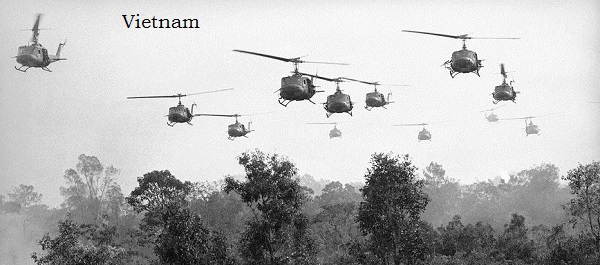


Cerro Gordo County Iowa
Part of the IAGenWeb Project
|
The Globe-Gazette
 The Globe Gazette will publish 50 stories — starting on Veterans Day — about North Iowa’s Vietnam Veterans. The stories will appear on Sundays and Wednesdays. We’ll culminate this "They Served With Honor" project with a special section (publishing on the day before Memorial Day) that will include all of the profiles. It will be great keepsake and resource for family members, educators and part-time historians.
by Ashley Miller, February 17, 2016
"I was never afraid of dying when I went to Vietnam," said Latham, who flew Huey helecopters. "I've never been afraid to this day. "It's just what I felt because of what we were going through, with a couple close friends of mine being shot down and killed." As an Iowa State student, Latham trained as a pilot through the Army's ROTC program. After graduating college and finishing flight school, he joined the 129th Assault Helicopter Company in November 1970, where he regularly flew South Vietnamese and Korean troops on combat missions. His company had a good relationship with those soldiers, Latham said. They felt especially secure with the Koreans, who had a reputation of not taking prisoners. A week after he arrived, he was involved in a skirmish at a base overrun by a North Vietnamse Army unit. After diesel fuel was dropped by Chinooks, his and other helicopters were to fire, in an effort to ignite the gas. Latham said it took three passes, since weapons had jammed. "After the third pass, we had tracers (ammuniton) coming back at us," he recalled. "You're so busy, you don't have a chance to think about that much, but later that night, it hit me - these guys are trying to kill me." Another memorable task involved rescuing Army of the Republic of Vietnam (ARVN) soldiers who were scattered in trees after a fire base was overrun near the Cambodian/Laotian border. "I still vividly recall the helicopters hovering into the 200-foot-tall trees and the ARVN soldiers put piling on," he said. The capacity of his Huey was 13. At one point the helicopter had 27 on board and was unable to take off. Latham said the crew chief and gunner had to push people back out, instead making multiple rescue trips. "It's an experience I would never want to go through again, but it's an experience I'd never give up," he said of his year in Vietnam. Latham was later stationed at Fort Campbell, Kentucky, where he worked as an instrument instructor pilot and officer in charge of school for pilots returning home. Following four years in the military, Latham returned home to Alexander, where he spent 37 years a owner/operator of Latham Seed Co. He has since retired from the seed business but continues to farm. He hasn't felt any lasting effects of serving in combat. "My wife might disagree with me on that," Latham said. "She likes to joke for a couple of years I'd be standing up in bed in the middle of the night, trying to untie rotor blades." Latham has been back to Vietnam twice on business, which he said was an emotional experience. In talking with a friend who was a major in the North Vietnamese Army and now manages the American Soybean Office there, he learned about the regard North Vietnamese had for American soldiers, who targeted the military, not civilians. "They had a lot of respect for our ethics and the way we conducted ourselves in the war," Latham said. As an agronomy major on a trip to Communist Poland in 1968, a professor from the University of Warsaw was excited to talk to his group about his sister, who was living in Philadelphia. A guide questioned what the professor had been telling them - he said just crop talk - and told their group to disregard anything that was discussed. "I'm not sure if there was retribution for that little man, but it made a lasting impression on me about what communism's control[ing] mindset can do to a population," Latham said. "The fact that the U.S. took a stand in Vietnam - we stopped the spread of communism in southeast Asia," he continued. "What we did was the right thing. It was successful in a way that most people don't realize."
Photograph courtesy of Globe Gazette
|